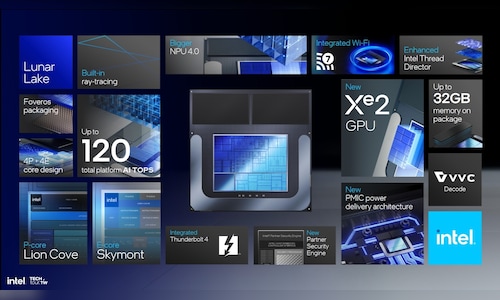
The Lunar Lake CPUs, exemplified by the Core Ultra 7 258V in the ASUS S14, provide a balance of good battery life and x86 compatibility but come with mixed performance results, Ars Technica reported. While they offer impressive battery life — around 16.5 hours in testing — and meet Microsoft’s Copilot+ requirements, their performance is inconsistent.
Despite the mixed results, ASUS is happy with its partnership with Intel, calling the Lunar Lake CPUs the “epitome of power, performance, efficiency, and seamless support to AI-first solutions.”

Sam Huang
Sam Huang, Country Product Manager at ASUS India, said, “Lunar Lake has made the computing process 3x more powerful while increasing efficiency to up to 50% in comparison to its predecessors.”
Huang said the ASUS-Intel partnership aims to enhance performance and efficiency, making powerful computing accessible to a broader audience.
“Integrating innovative technology that ensures a seamless customer experience is crucial at ASUS,” Huang said.
What is Lunar Lake?
Lunar Lake features an advanced 8-core configuration without hyperthreading, which is a technology that allows a single processor to manage multiple tasks at the same time, enhancing overall performance.
Also read: ASUS ROG Zephyrus G16 Review: A powerful, portable and light gaming laptop
The chipset utilises a two-cluster approach with four efficiency cores for handling workloads and as many performance cores for peak performance. This design, Huang said, allows for enhanced memory subsystems. “Intel boasts the fastest single-core performance for thin and light AI PCs,” Huang noted, emphasising the significance of this innovation.
ASUS and AI
The integration of artificial intelligence (AI) capabilities into PCs is another focal point for ASUS. Huang is of the opinion that as consumers invest in these novel technologies, costs will decrease over time.
“With AI in the picture and notably higher-efficiency neural processing units, chips are certainly able to do more with less. In the coming years, as we keep developing and understanding areas to increase efficiency, the cost will invariably reduce over time,” he stated.
Huang said Lunar Lake’s efficiency is further underscored by its ability to deliver a full workday’s worth of battery life while maintaining high performance for regular workloads. He said the Zenbook S14 achieves up to 40% reduced energy usage and enhances AI-driven tasks by a factor of four, showcasing the chipset’s potential for real-time adjustments in applications like Windows Copilot.
An ultraportable future?
According to Huang, ASUS’ collaboration with Intel was aimed at creating an ultraportable PC that delivers unparalleled performance powered by AI. That ultraportable PC, Huang said, is the Zenbook S14.
Huang sees a future in which PCs and chipsets will achieve unmatched performance, enabling seamless automation and extended battery life. As the computing industry evolves, Huang felt that Intel’s Lunar Lake chips are poised to herald a new era of efficiency and performance, making advanced technology more accessible to consumers.
Also read: Asus Zenbook S14 OLED (2024) Review: Solid performance but rivals are faster
(Edited by : Shoma Bhattacharjee)
First Published: Nov 22, 2024 6:33 PM IST






